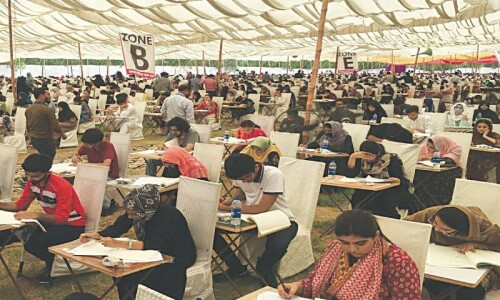 KARACHI, Jan 4: While consumers appear panicked enough to procure flour at any cost given the current political turmoil after the assassination of Benazir Bhutto, flour millers and retailers are out to cash in on the situation by pushing up the flour rates.
KARACHI, Jan 4: While consumers appear panicked enough to procure flour at any cost given the current political turmoil after the assassination of Benazir Bhutto, flour millers and retailers are out to cash in on the situation by pushing up the flour rates.
Many retailers tell customers that they don’t have flour stocks available. Other retailers who have been holding the commodity warn consumers to buy it at any cost, given the uncertainty of the future and the on-going wheat crisis.
Millers have jacked prices up under the pretext of wheat shortages and rising prices. Retailers, also offering the same excuses, have been on the rampage in order to make the most profit. As a result, consumers are at the mercy of market forces that enjoy a free hand to manipulate prices in the absence of any effective governmental check on rates, or on the wheat and flour stocks.
Retailers are currently demanding Rs260-270 for a 10kg sack of Ashrafi atta as compared to Rs250 a few days ago and Rs230 on Jan 1. They say that their stocks are limited since the supply from the Ashrafi producer has been suspended for many days. However, the commodity is not available at all in many stores. Consumers paid Rs300 for the same sack and other sacks of fine atta during the three-day shutdown last week.
If consumers show interest, some retailers are demanding Rs135 for a 5kg sack of chakki atta while the majority of the retailers say that it is not available due to an acute shortage. A week ago, it was available at Rs120-125 per 5kg.
If a consumer demands fine atta of a brand other than Ashrafi, retailers demand Rs145 for 5kg as compared to the standard Rs130-135 few days ago.
On Friday, Karachi millers increased the rate of atta to Rs1,750 per 80kg bag from Rs1,650 on Monday, while it was Rs1,600 after Eid ul Azha and Rs1,525 three weeks ago. By way of explanation, millers quote the rate of wheat bags at Rs2,150 per 100kg in the open markets as compared to Rs2,000 a few days ago and Rs1,600-1,700 before Eid-ul-Azha.
However, wholesalers quote the wheat rate at Rs2,070 per 100kg bag and Rs18 per kg for mill atta at the wholesale stage.
As political uncertainty looms, many consumers with enough liquidity appear unconcerned about the quality of flour. Given the current law and order situation, many think that is better to have the commodity at any cost rather than suffer at the hands of retailers in case of a crisis situation.
The real victims
The real victims are people from the low income bracket who cannot afford the rocketing prices under their limited daily or monthly budget. They are dependent on the state-run utility stores, and even there, few succeed in their first day’s effort to purchase a 10kg bag at Rs130 after standing in long queues.
The Sindh government’s decision to provide atta at Rs160 per 10kg bag in various areas remains a dream for the majority of the population since there are hardly any stalls in the main residential areas of the city. The majority of the stalls are set up outside the flour mills in the industrial areas.
Flour millers are equally responsible for the surge in prices since they always hail the Food Department’s decision to increase the wheat quota to every mill, in addition to assuring stability in rates. When they receive the quota, however, they suddenly term it inadequate and increase the prices, linking the increase to rising wheat prices. This has been practiced by the mills for the past three weeks.
Currently, each mill is getting 3,150 bags of 100kg per week, compared to 2,730 bags per week last month. A month ago, each mill was getting only 2,280 bags.
The chairman of the Sindh zone of the Pakistan Flour Mills Association (PFMA), Chaudhry Ansar Jawed, told Dawn that an increase in wheat supply from the Food Department is not the solution.
“The 150 mills in Sindh need 325,000 tons of wheat per month for grinding, but they are getting only 180,000 tons,” he said, adding that both atta and wheat have been in short supply in the open market.
He said that the federal government should issue orders for the lifting of the ban on the movement of wheat from Punjab to the Sindh mills. Only Karachi’s mills were getting 90,000-100,000 tons of wheat per month from the Punjab, which had been stopped, he said, pointing out that in addition, mills are getting imported wheat bags at Rs1,215 per 100kg.
Mr Jawed came up with an unusual solution and asked the government to liberalise the lifting of imported wheat as much as a mill can lift at higher prices. When asked whether consumers would suffer if mills were to lift imported wheat at higher prices, he said that this would, to some extent, help counter the atta shortage as well as the panic amongst consumers.
The general-secretary of the Karachi Retail Grocers Group (KRGG), Farid Qureishi, said that in his view, retailers had not been hoarding atta in order to fetch handsome prices upon rising demand, since atta could not be held for a long period. “People have actually become frightened after the past week’s closures and they are buying atta in bulk,” he said. “Many people are demanding 15kg of atta although their requirement is of 10kg, while a person who used to buy only 5kg is now purchasing 10kg so that he can keep stocks in hand to weather any political storm.”
The chairman of the Karachi Wholesale Grocers Association (KWGA), Anis Majeed, told Dawn that there is a shortage of both wheat and atta in the market.












































Dear visitor, the comments section is undergoing an overhaul and will return soon.